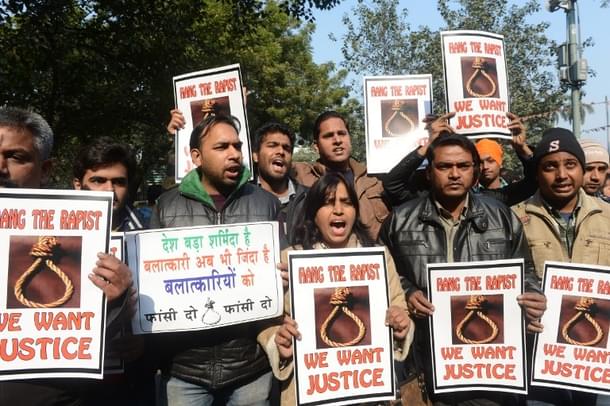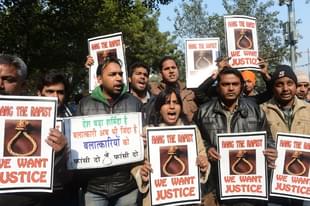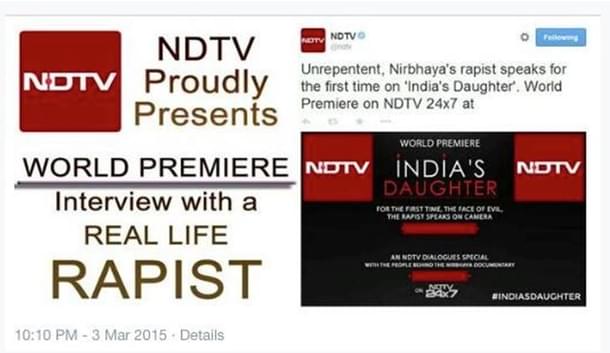Culture
A Rape Documentary, A Ban, And Various Shades Of Grey
Smita Barooah
Mar 06, 2015, 06:13 PM | Updated Feb 11, 2016, 08:39 AM IST
Save & read from anywhere!
Bookmark stories for easy access on any device or the Swarajya app.


Flawed as it is, the documentary should not be banned. As a society we need to stop hiding and confront issues head on
The British Broadcasting Corporation (BBC) commissioned a documentary titled “India’s Daughter”, where the filmmaker included the interview of one of the rapists of a young woman known as “Nirbhaya” (the fearless one). It was due to be aired by the Indian channel NDTV. However, news of the show snowballed into a gigantic social and political controversy. The Government of India eventually intervened and banned the telecast on ground that it violated various norms.
The turn of events has led to a barrage of opinions, most of them on predictable lines: Political allegations, celebrities spouting inanities about freedom of expression, feminists raging about misogyny and patriarchy, men either bending backwards to prove how non-misogynistic they are, or going on the defensive, sanctimonious non-Indians discussing the “terrible Indian rapist mindsets”. In the midst of this noise, I sat back and contemplated on my own conflicting views.
As Indian, I was offended that a British filmmaker called India a “sick society”. The blanket, derogatory categorization of my people rankled. As a viewer, I was appalled at the callousness of the television channel that chose to sell a grim documentary like a cheap soap opera. One of their advertisements stated: “ NDTV proudly presents world premiere interview with a real life rapist”.
What exactly was the channel proud of? Proud that they had managed to package a tragedy with a big dollop of sensationalism? The entire approach was obnoxious.

As a woman, I was nauseated. The Nirbhaya rape case continues to have a devastating impact on my psyche. I was not prepared to see or hear her rapist.
At the same time, as a mental health therapist, I was curious: Was there a lager point to the documentary than just earning TRPs? What message would potential sexual predators derive from the show? Was this the appropriate way to handle such a sensitive issue?
First, let me start with the intent of BBC and the filmmaker. It is possible, as alleged by many, that the documentary was made with the aim of showing down the “natives” and elevating the “white race” by contrast. This comes across when the filmmaker repeatedly uses terms like “sick society” and “diseased culture” to characterize India in her interviews. The tone smacks of sanctimonious hypocrisy. It is quite different from BBC exploring the gender issue as opposed to cultural labeling.
However, all these criticisms do not take away from the ugly truths that the documentary explored. The fact is that in our country, there are some people with a primitive mindset. We have problems with the status of women and violence. Slamming the documentary does not erase these issues. The reality remains.
Second, NDTV marketed the documentary in crass way. However, a news channel’s sensibilities are a reflection of its own values. It need not be a reflection on the content of the documentary.
Third, I have watched the documentary and I realize that perhaps my initial reluctance to see the show was symptomatic of a larger, common malaise. At some level, I too was unconsciously perpetrating the classic pattern of sweeping painful things under the carpet. This is typically what happens after all such gruesome acts. We move on and try to forget. Yet, at some level we know that the only way to heal is to address the cause of pain and deal with it.
Fourth, irrespective of the intent of the filmmaker, the controversy around the documentary is likely to have a positive impact in terms of educating the public. By highlighting a type of regressive mindset that prevails among some people, it has galvanized public opinion and unearthed a taboo subject. As a result, a few more people have been sensitized. This will hopefully translate into more action in terms of crime prevention and victim rehabilitation.
Fifth, even if we assume that some people would watch the show driven by titillation and voyeurism, what matters is the end result. If viewers are able to derive some positive insight from the show, the original intent is irrelevant.
Sixth, as a therapist I know that a potential predator can view the rapists portrayal in a twisted way. It may be a trigger as they may identify with the rapist and his views. They may get emboldened to act out their own perverse fantasies to achieve notoriety. This may appear strange to a normal person but as we know predators work on a different logic. For instance, the Columbine High School massacre inspired many others in the US, even though the general public was horrified.
However, I also realize that other triggers for sexual predators abound. Banning a documentary will not stop them. Social awareness and effective law enforcement will.
Finally, telling stories of violence and abuse effectively is a fine craft. Shows like Satyameva Jayate for instance, tackled the horror of child rape in a sensitive yet powerful way, and it forced people to think. I wish the documentary makers had been more interested in the topic than their cultural propaganda.
On balance, I have to say that I have problems with the documentary at various levels. However, I believe that the issues, which the show touched upon, are important. Flawed as it is, the documentary should not be banned. As a society we need to stop hiding and confront issues head on. The problem of rape, and the perverse views of the rapist and his supporters are not unique to India. It is a tragic, ugly and universal reality. But in the end, we can only impact and change what is ours.
Addictions counsellor. Holds degrees in Political science. Interested in photography and writing.





